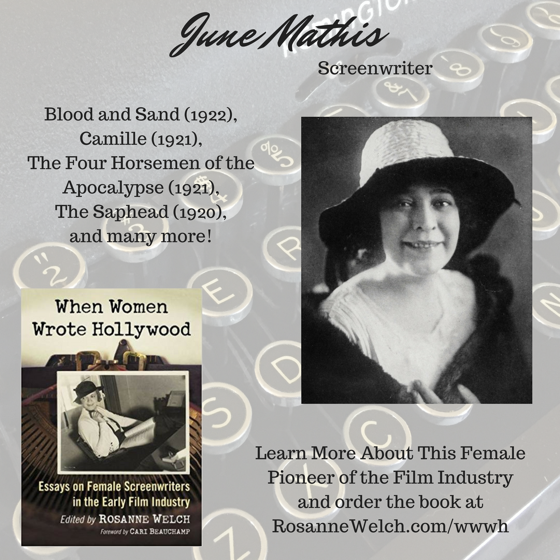
When Women Wrote Hollywood – 18 in a series – June Mathis
June Mathis (January 30, 1887 – July 26, 1927) was an American screenwriter. Mathis was the first female executive for Metro/MGM and at only 35, she was the highest paid executive in Hollywood.[1] In 1926 she was voted the third most influential woman in Hollywood, behind Mary Pickford and Norma Talmadge.[2] Mathis is best remembered for discovering Rudolph Valentino and writing such films as The Four Horsemen of the Apocalypse (1921) and Blood and Sand (1922).
Mathis was determined to become a screenwriter and, accompanied with her mother, she moved to New York City, where she studied writing and went to the movies in the evenings.[6] She entered a screenwriting competition; but despite not winning, her entry was so impressive it did bring job offers. Her first script, House of Tears, would be directed by Edwin Carewe in 1915 and led to a contract in 1918 with Metro studios, later to be merged into MGM. As one of the first screenwriters to include details such as stage directions and physical settings in her work, Mathis saw scenarios as a way to make movies into more of an art form. Much of the standard screenwriting styles can be attributed to her. Mathis later credited her success to a strong concentration on plot and theme: “No story that did not possess a theme has ever really lived…. Occasionally one may make money and perhaps be popular for a time. But in the end it dies.”[6]
By 1919 Mathis and her mother had moved to Hollywood. After only a year of screenwriting, she had advanced to the head of Metro’s scenario department.[7] She was one of the first heads of any film department and the only female executive at Metro.[8]
During her early years, she had a close association with silent star Alla Nazimova. Their films together can be said to be marked by over-sentimentality; what little praise these films received was due to Nazimova’s acting rather the conventional romantic stories.[6] — Wikipedia
Watch a movie by June Mathis
More about June Mathis
- Read more about this screenwriter in When Women Wrote Hollywood
- Like When Women Wrote Hollywood on Facebook
- June Mathis on Wikipedia
- June Mathis on IMDB
- June Mathis at the Women Film Pioneers Project
- June Mathis on Virtual History
Buy a signed copy of when Women Write Hollywood
* A portion of each sale from Amazon.com directly supports our blogs
** Many of these books may be available from your local library. Check it out!
† Available from the LA Public Library
